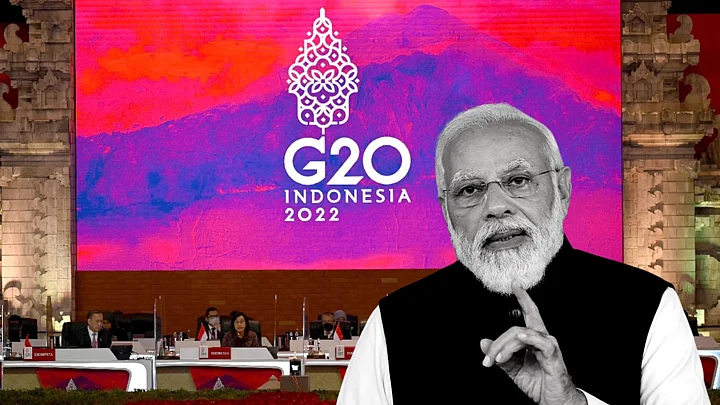On Tuesday, 15 November, Indian Prime Minister Narendra Modi, along with other world leaders, will gather in Bali, Indonesia for the annual G20 summit.
However, tensions have remained high even before the meetings began, owing to Russia’s presence in the meeting amid its invasion of Ukraine. Even though Russian President Vladimir Putin pulled out, Moscow will be represented by veteran Foreign Minister Sergei Lavrov.
PM Modi is on a three-day visit on account of the summit and said that he will hold extensive discussions with other global leaders on pressing global challenges such as reviving global growth, food and energy security, health, environment, and digital transformation.
The prime minister said that he will meet with several leaders from participating countries “on the sidelines” and review progress in India’s bilateral ties with them. However, there is no confirmation on the leaders Modi is set to meet.
“Bilateral engagements with the other leaders are still in the process of being scheduled. This is something which remains under evolution,” Foreign Secretary Vinay Kwatra said on Sunday, a day before Modi's departure.
PM Modi will be handed the G20’s presidency at the closing ceremony of the Bali summit.
“I will also extend my personal invitation to G20 Members and other invitees to our G20 Summit next year,” Modi said.
The G20's Agenda
The summit is the largest gathering by the group of leaders since the beginning of the COVID pandemic, with Indonesia, as the host state, setting an agenda that focusses on economic recovery from COVID, sustainable energy, and global health measures.
It comes at a time where the world has multiple burning fires in the form of Russia’s invasion of Ukraine and its global fallout, a serious climate crisis, North Korea’s increasingly concerning nuclear programme, and China’s growing global ambitions.
The meeting’s motto – “Recover Together, Recover Stronger” – is an accurate summation of the meeting’s agenda.
Indonesia has said that its presidency of the G20 is guided by concepts of collective recovery as the world struggles to cope with overweighing global crisis, in areas of health, education and international commerce.
Governments and the global entities will also discuss the best ways to ride the digital revolution wave and how to ensure reaping a wide range of benefits from it.
Working sessions will analyse the possible insertion of Micro, Small and Medium Enterprises (MSMEs) into the digital ecosystem, and will also discuss digital entrepreneurship and revitalizing women’s roles in the workplace, using digital skills.
Also on the agenda is promoting transfer to a cleaner, greener energy source to assure a brighter future for global citizens. The conference will also focus on energy affordability, clean and smart energy technology.
However, thanks to multiple geopolitical tussles between Russia and NATO, the G20 is set to be underway with a divided house.
Why Does G20 Matter to Modi?
The summit's motto outlines three areas of recovery that have remained on India's list of challenges since the beginning of the pandemic.
Since the onset of the COVID pandemic, India has grappled with the human loss attached to the virus, but also suffered from mounting inflation and a wavering geopolitical scenario. However, there has been some improvement with Reserve Bank of India (RBI) data showing increased foreign investment since March 2022.
However, Modi has also faced mounting pressure with respect to the increasing unemployment and the lack of investment, and will hope that the summit materialise in the form of strategic foreign investment.
In the field of energy, despite being aggressive in their approach with green energy options in its aim to achieve net-zero emissions by 2070, the geo-political conditions due to Russia's invasion has led to severe supply chain constraints, increased energy prices, and sky-high inflation.
These concerns would surely be on the PM's list, especially after Union Finance Minister Nirmala Sitharaman stated that the Indian government is concerned with uncertainties in the energy sector.
However, it is unlikely that the Bali summit culminates into a joint communiqué given the geopolitical tussle around the world, and a lack of consensus on the issues causing them
(At The Quint, we question everything. Play an active role in shaping our journalism by becoming a member today.)
